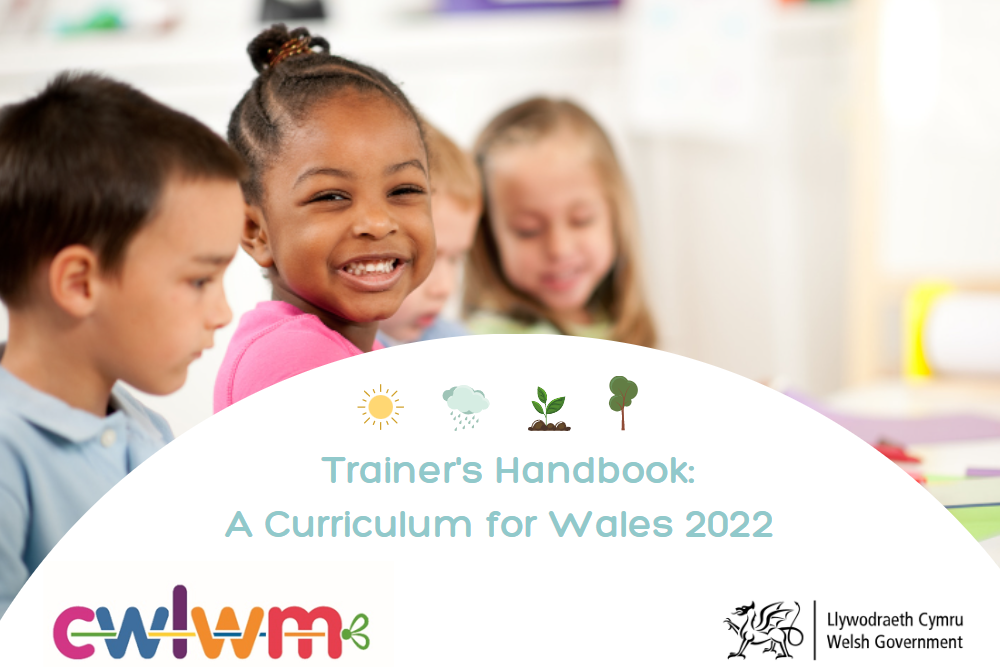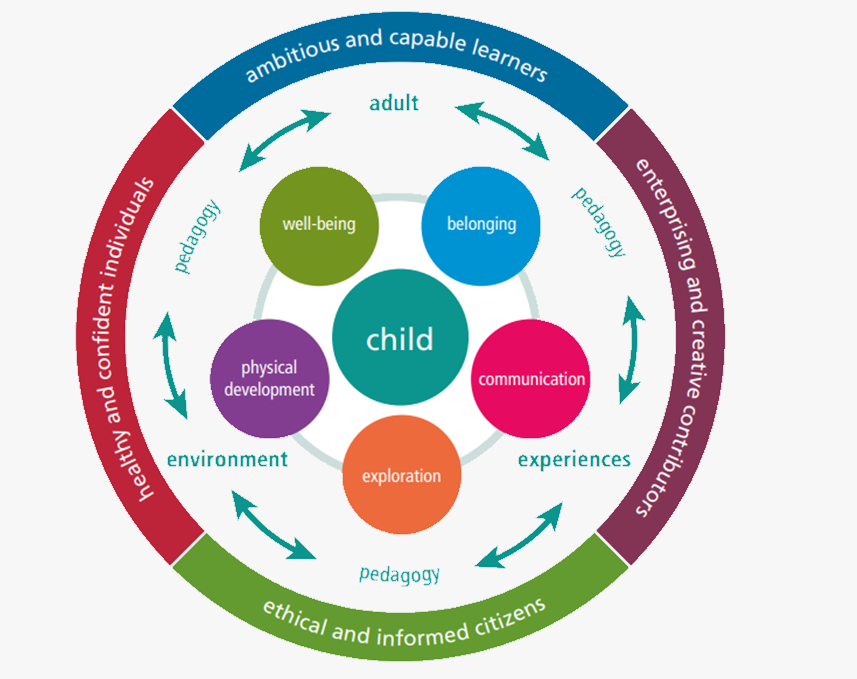
Our Early Years Education Officer is funded by Welsh Government to identify, develop and share effective practice across Wales.
Early Years Wales are also supporting the development of the Curriculum for Wales 2022 and alongside practitioners we have supported the co-construct of a 'Curriculum for funded non-maintained nursery settings'
For more information contact: Kelcie Stacey, [email protected] or 07983 468552.
How we do this
- Working with individual settings on request
- Working alongside practitioners on co-constructing the Curriculum for funded non-maintained nursery settings and assessment
- Delivering appropriate events and workshops
- Creating resources e.g our Foundation Learning: Talking Point feature in every issue of smalltalk magazine
- Sharing good practice and skills development by email, online or termly in smalltalk magazine
The funded non-maintained curriculum has been designed for the sector by the sector and seeks to provide children with a sense of belonging and pride whilst celebrating the diverse culture of Wales.
As we already know high-quality early education provision is essential to children's development and the curriculum aspires to provide firm foundations to support children's positive experiences for lifelong learning. It addresses the 'how' and 'why' of curriculum design to support children to develop as:
- Ambitious, capable learners
- Enterprising, creative contributors
- Ethical informed citizens
- Healthy, confident individuals
Childrens holistic development is at the forefront of the curriculum pedagogical practice and links closely to the principles of child development, as well as the four purposes of the curriculum and the statement of what matters of the six areas of learning and experience.
The curriculum should be used to support planning to ensure the best use of your settings environment and resources available whilst utilising support from relevant partners to develop appropriate learning environments and ensure we provide a developmentally appropriate curriculum through the knowledge of: Enabling adults, engaging experiences, effective environments and pedagogy whilst emphasizing play as a fundamental right for all children.
This curriculum ensures that the mandatory elements of Curriculum for Wales are embedded within an appropriate pedagogical framework that focuses on the needs of the developing child through five development pathways:
- Belonging
- Communication
- Exploration
- Physical development
- Well-being
Introduction to the Curriculum for Wales 2022
| Attachment | Size |
|---|---|
| 443.35 KB |
| Attachment | Size |
|---|---|
| 16.01 MB |

Observation plays an integral role in your practice and should be the catalyst for planning. Through in-depth analysis of observations, assessment can take place. Assessment plays a fundamental role in enabling each individual child to make progress at an appropriate pace whilst ensuring they are challenged and supported along the way.
Assessment arrangements for funded non-maintained nursery settings
These assessment arrangements have been co-constructed with key partners to support practitioners in funded non-maintained nursery settings which have adopted the curriculum for funded non-maintained nursery settings.
The arrangements take account of the needs of all learners and recognise that their identity, language, ability, background and prior learning, as well as the support they may need, will differ according to their particular circumstances.
These arrangements will also support settings to:
- understand progression in children's learning
- apply the principles of progression in practice
- develop a shared understanding of progression across the setting
- use observation to inform provision that supports children to make progress
- know about and implement initial and ongoing assessment arrangements
The Curriculum for funded non-maintained nursery settings:
- Underpinned by the four purposes of Curriculum for Wales.
- Covers the six areas of learning and experience
- Encompasses the 27 statements of what matters
- Included the mandatory curriculum elements
- Encompasses the mandatory cross-curricular skills
- Reflects the principles of progression
The Curriculum for funded non-maintained nursery settings can be used in its entirety and does not need to be used as well as the Curriculum for Wales.
A resource highlighting the importance of using 'serve and return interactions' to enhance curriculum learning:
Click here for more information |

From birth, children repeat their actions and behaviours (schema). For example, grasping, lifting, sucking, mouthing, waving and banging are all early schemas.
What is a schema?
Children have a natural urge to do the same things again and again, whether it is throwing things, hiding things all over the house in bags, or emptying all the toys out of the box. This repetitive behaviour helps children to develop and deepen their understanding of concepts.
Why are they important?
Schemas link directly to how the young brain develops and grows. As children repeat their actions they make important connections in their brains, which helps them to modify or make changes to their actions. This is a vitally important element in young children's development and learning.
Parents, practitioners and carers
Parents, practitioners and carers can support children by understanding schemas and encourage children to play and learn in a way that links to the child's schematic interests.
Observing schemas
Knowledge of schemas can help you to describe in more detail the ways in which a child is approaching learning. You can use this knowledge to help you understand a child's behaviour.
Let's go schema spotting...
If you would like to learn more about how you can recognise a child's schema and what the different schemas are called, Early Years Wales have published a handy guide, written by Stella Louis, to observing schemas and will help parents and carers recognise a child's schema and what it is called. Members can download a copy for free.
Simply log-in to your account and visit our shop page. Not a member? Early Years Wales membership is currently FREE! Check out our membership page for a full list of membership benefits.

In 2021 Early Years Wales published a 2-part series on the importance of risky play and schema development in smalltalk magazine.
Written by Dr Amanda Thomas and Pavla Boulton, University of South Wales, the articles are intended to support and inspire Early Childhood Educators and Early Childhood Student practitioners in the field of early years and early childhood education, to develop knowledge and understanding of how to support children's schematic development using loose parts and risky play, by accessing the outdoor natural environment.
In partnership with Cwlwm, the articles have been updated for publication in the Cwlwm Summer Newsletter, featuring a special Foreword from the authors. You can download the articles below:
Outdoor Risky Play and Schema Development
Early Years Wales

Estyn inspects quality and standards in education and training providers in Wales using the Common Inspection Framework. There is one framework for all schools, independent specialist colleges, pupil referral units and work-based learning providers and another framework for all other sectors (non-maintained nurseries, further education, initial teacher education and training, local government education services and Welsh for adults).
Estyn will inspect all providers at least once during the seven-year period which began 1 September 2016. The notice period of inspection is different for each sector. Non-maintained settings receive a 10 day notice period.

It is a very exciting time in the history of education in Wales. Would you like to know more about the background and context of the reform? Are you keen to equip yourself with the current knowledge and understanding of the new curriculum's basic principles? Do you want to be at the forefront of delivering education at this evolving time?
Developed by Cwlwm, this training resource offers a clear and lighthearted presentation into the methodology and development of Curriculum for Wales 2022.
Simply log-in to your account and visit our shop page to access. Not a member? Check out our membership page for a full list of membership benefits.
Professional Learning Modules
During the last year Early Years Wales has been engaged in developmental discussions within wider stakeholder groups, and the Welsh Government, to update and refresh the ECEC approach in Wales. In line with other policy developments, in Wales this model of working with children aged 0-5 will be called Early Childhood Play, Learning, and Care (ECPLC).
The ECPLC approach will support practitioners to consider their practice and the ECPLC Quality Framework aims to support practitioners, leaders, schools, LA's and parents with a shared understanding of the various requirements needed to provide high quality childcare, learning and play for children in early years.
| Attachment | Size |
|---|---|
| 1.11 MB |
September 2023
Through the Eyes of a Child is a bespoke resource, commissioned by Early Years Wales and created by Nia Beynon, Early Years Consultant, trainer, and conference speaker.
Click here for more information |
Using a targeted programme to support Quiet, Shy and Anxious (QSA) Learners in the Early Years Classroom. This guide and webinar is designed to support you as practitioners in how to spot QSA children in your setting and how to support them.
Click here for more information |
Useful resources
| Attachment | Size |
|---|---|
| 558.18 KB |
smalltalk_November 2024
| Attachment | Size |
|---|---|
| 544.77 KB |
| Attachment | Size |
|---|---|
| 1007.21 KB |
| Attachment | Size |
|---|---|
| 675.58 KB |
| Attachment | Size |
|---|---|
| 1.13 MB |
| Attachment | Size |
|---|---|
| 1.23 MB |
Useful Links:
University of Wales Trinity Saint David
Arts Council of Wales (2021)
Learning through Landscapes
cwlwm.org.uk


